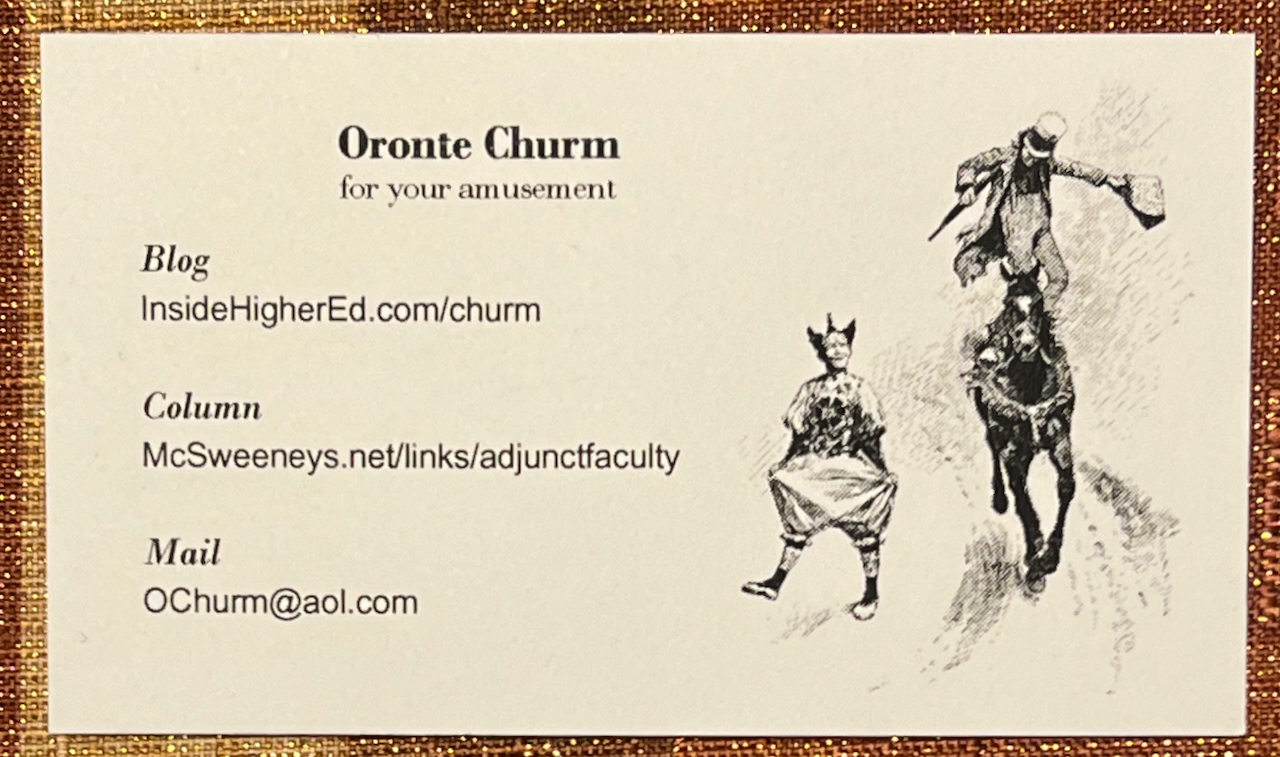
A business card for Oronte Churm, in the old days. (Photo by John Griswold.)
I was explaining to my son how classical Asian poets known as Stonehouse, Cold Mountain, Spring Essence, and Bashō (a raggedy, unproductive form of banana tree) took pen names from significant places or things in their lives. These names have a comic quality now for their simplicity and the way they conspire with time to downplay the poets’ specific human identities. The poets applied the names to themselves, however: an important move.
Never ask your children or close friends to name or represent you. My son, taking his cue during our conversation from trash bins at the curb, said my classical-poet name could be Bald Trash Can. Later, a friend of thirty years said it should be Dirty Worn-Out Apartment Dweller.
“It’s a townhouse,” I said weakly. Then I wondered if “dirty” and “worn-out” was about me, not my place.
The other day someone I have corresponded with professionally over the years said he just realized I used to write as Oronte Churm at more than one venue. He had enjoyed that work but never made the connection to “me.” The pen name is a combination of characters’ names from the Henry James story “The Real Thing”; Oronte is floral and Churm is muddy, a comical combination. More importantly, the short story questions who or what is “real” in art and life, and that seemed pertinent to my situation then.
We want to be known for what we think we contain.
Russian painter Isaac Levitan told a friend, “When my sister says, ‘Why do you paint a gray day or a muddy road?’ I say nothing. But if a woman I loved said this, my woman, I would leave her right away. […] My sketch, this tone, this blue road, this sadness in the shaft of light beyond the forest, this is me, my spirit. It’s in me. And if she doesn’t see this, doesn’t feel it, then who are we? Strangers. What will I talk to her about?”
I suppose I am comic, by appearance, career, behavior, and travails, and I often have a good time with it, but sometimes I wish I were less so. Last week an old artist friend and I exchanged greetings. He was so excited that later he emailed me four sketches of my head. They were caricatures but accurate enough for me to order delivery that night, because it was clear my nose would never fit out the doorway of my townhouse so I could dine-in at the restaurant.
If I looked like Anderson Cooper I would be Hemingway by now, I thought sulkily, lying on my couch, eating short ribs braised in red wine, glazed carrots, crispy kale, and whipped potatoes with short-rib gravy.
I still have other sketches my friend did in the old days, including one of me as an egghead intellectual at a desk, with the caption, “Mr. Grizwald likes to think hard.”
“Hm,” he has me saying ponderously in the speech balloon.
Fair enough. Besides, I have known tragic figures that did not generally exist, and I would rather be comic by particulars any day of the week.
